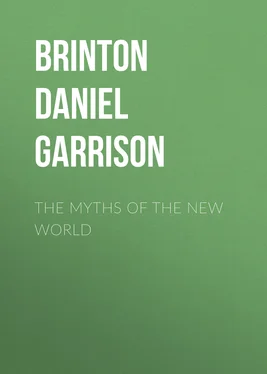Daniel Brinton - The Myths of the New World
Здесь есть возможность читать онлайн «Daniel Brinton - The Myths of the New World» — ознакомительный отрывок электронной книги совершенно бесплатно, а после прочтения отрывка купить полную версию. В некоторых случаях можно слушать аудио, скачать через торрент в формате fb2 и присутствует краткое содержание. Жанр: foreign_prose, История, Старинная литература, Мифы. Легенды. Эпос, foreign_edu, foreign_antique, на английском языке. Описание произведения, (предисловие) а так же отзывы посетителей доступны на портале библиотеки ЛибКат.
- Название:The Myths of the New World
- Автор:
- Жанр:
- Год:неизвестен
- ISBN:нет данных
- Рейтинг книги:5 / 5. Голосов: 1
-
Избранное:Добавить в избранное
- Отзывы:
-
Ваша оценка:
- 100
- 1
- 2
- 3
- 4
- 5
The Myths of the New World: краткое содержание, описание и аннотация
Предлагаем к чтению аннотацию, описание, краткое содержание или предисловие (зависит от того, что написал сам автор книги «The Myths of the New World»). Если вы не нашли необходимую информацию о книге — напишите в комментариях, мы постараемся отыскать её.
The Myths of the New World — читать онлайн ознакомительный отрывок
Ниже представлен текст книги, разбитый по страницам. Система сохранения места последней прочитанной страницы, позволяет с удобством читать онлайн бесплатно книгу «The Myths of the New World», без необходимости каждый раз заново искать на чём Вы остановились. Поставьте закладку, и сможете в любой момент перейти на страницу, на которой закончили чтение.
Интервал:
Закладка:
Daniel G. Brinton
The Myths of the New World / A Treatise on the Symbolism and Mythology of the Red Race of America
PREFACE
I have written this work more for the thoughtful general reader than the antiquary. It is a study of an obscure portion of the intellectual history of our species as exemplified in one of its varieties.
What are man’s earliest ideas of a soul and a God, and of his own origin and destiny? Why do we find certain myths, such as of a creation, a flood, an after-world; certain symbols, as the bird, the serpent, the cross; certain numbers, as the three, the four, the seven—intimately associated with these ideas by every race? What are the laws of growth of natural religions? How do they acquire such an influence, and is this influence for good or evil? Such are some of the universally interesting questions which I attempt to solve by an analysis of the simple faiths of a savage race.
If in so doing I succeed in investing with a more general interest the fruitful theme of American ethnology, my objects will have been accomplished.
Philadelphia,
April, 1868.CHAPTER I.
GENERAL CONSIDERATIONS ON THE RED RACE
Natural religions the unaided attempts of man to find out God, modified by peculiarities of race and nation.—The peculiarities of the red race: 1. Its languages unfriendly to abstract ideas. Native modes of writing by means of pictures, symbols, objects, and phonetic signs. These various methods compared in their influence on the intellectual faculties. 2. Its isolation, unique in the history of the world. 3. Beyond all others, a hunting race.—Principal linguistic subdivisions: 1. The Eskimos. 2. The Athapascas. 3. The Algonkins and Iroquois. 4. The Apalachian tribes. 5. The Dakotas. 6. The Aztecs. 7. The Mayas. 8. The Muyscas. 9. The Quichuas. 10. The Caribs and Tupis. 11. The Araucanians.—General course of migrations.—Age of man in America.—Unity of type in the red race.
WHEN Paul, at the request of the philosophers of Athens, explained to them his views on divine things, he asserted, among other startling novelties, that “God has made of one blood all nations of the earth, that they should seek the Lord, if haply they might feel after him and find him, though he is not far from every one of us.”
Here was an orator advocating the unity of the human species, affirming that the chief end of man is to develop an innate idea of God, and that all religions, except the one he preached, were examples of more or less unsuccessful attempts to do so. No wonder the Athenians, who acknowledged no kinship to barbarians, who looked dubiously at the doctrine of innate ideas, and were divided in opinion as to whether their mythology was a shrewd device of legislators to keep the populace in subjection, a veiled natural philosophy, or the celestial reflex of their own history, mocked at such a babbler and went their ways. The generations of philosophers that followed them partook of their doubts and approved their opinions, quite down to our own times. But now, after weighing the question maturely, we are compelled to admit that the Apostle was not so wide of the mark after all—that, in fact, the latest and best authorities, with no bias in his favor, support his position and may almost be said to paraphrase his words. For according to a writer who ranks second to none in the science of ethnology, the severest and most recent investigations show that “not only do acknowledged facts permit the assumption of the unity of the human species, but this opinion is attended with fewer discrepancies, and has greater inner consistency than the opposite one of specific diversity.” 1 1 Waitz, Anthropologie der Naturvoelker , i. p. 256.
And as to the religions of heathendom, the view of Saint Paul is but expressed with a more poetic turn by a distinguished living author when he calls them “not fables, but truths, though clothed in a garb woven by fancy, wherein the web is the notion of God, the ideal of reason in the soul of man, the thought of the Infinite.” 2 2 Carriere, Die Kunst im Zusammenhang der Culturentwickelung , i. p. 66.
Inspiration and science unite therefore to bid us dismiss the effete prejudice that natural religions either arise as the ancient philosophies taught, or that they are, as the Dark Ages imagined, subtle nets of the devil spread to catch human souls. They are rather the unaided attempts of man to find out God; they are the efforts of the reason struggling to define the infinite; they are the expressions of that “yearning after the gods” which the earliest of poets discerned in the hearts of all men. Studied in this sense they are rich in teachings. Would we estimate the intellectual and æsthetic culture of a people, would we generalize the laws of progress, would we appreciate the sublimity of Christianity, and read the seals of its authenticity: the natural conceptions of divinity reveal them. No mythologies are so crude, therefore, none so barbarous, but deserve the attention of the philosophic mind, for they are never the empty fictions of an idle fancy, but rather the utterances, however inarticulate, of an immortal and ubiquitous intuition.
These considerations embolden me to approach with some confidence even the aboriginal religions of America, so often stigmatized as incoherent fetichisms, so barren, it has been said, in grand or beautiful creations. The task bristles with difficulties. Carelessness, prepossessions, and ignorance have disfigured them with false colors and foreign additions without number. The first maxim, therefore, must be to sift and scrutinize authorities, and to reject whatever betrays the plastic hand of the European. For the religions developed by the red race, not those mixed creeds learned from foreign invaders, are to be the subjects of our study. Then will remain the formidable undertaking of reducing the authentic materials thus obtained to system and order, and this not by any preconceived theory of what they ought to conform to, but learning from them the very laws of religious growth they illustrate. The historian traces the birth of arts, science, and government to man’s dependence on nature and his fellows for the means of self-preservation. Not that man receives these endowments from without, but that the stern step-mother, Nature, forces him by threats and stripes to develop his own inherent faculties. So with religion: The idea of God does not, and cannot, proceed from the external world, but, nevertheless, it finds its historical origin also in the desperate struggle for life, in the satisfaction of the animal wants and passions, in those vulgar aims and motives which possessed the mind of the primitive man to the exclusion of everything else.
There is an ever present embarrassment in such inquiries. In dealing with these matters beyond the cognizance of the senses, the mind is forced to express its meaning in terms transferred from sensuous perceptions, or under symbols borrowed from the material world. These transfers must be understood, these symbols explained, before the real meaning of a myth can be reached. He who fails to guess the riddle of the sphynx, need not hope to gain admittance to the shrine. With delicate ear the faint whispers of thought must be apprehended which prompt the intellect when it names the immaterial from the material; when it chooses from the infinity of visible forms those meet to shadow forth Divinity.
Two lights will guide us on this venturesome path. Mindful of the watchword of inductive science, to proceed from the known to the unknown, the inquiry will be put whether the aboriginal languages of America employ the same tropes to express such ideas as deity, spirit, and soul, as our own and kindred tongues. If the answer prove affirmative, then not only have we gained a firm foothold whence to survey the whole edifice of their mythology; but from an unexpected quarter arises evidence of the unity of our species far weightier than any mere anatomy can furnish, evidence from the living soul, not from the dead body.
Читать дальшеИнтервал:
Закладка:
Похожие книги на «The Myths of the New World»
Представляем Вашему вниманию похожие книги на «The Myths of the New World» списком для выбора. Мы отобрали схожую по названию и смыслу литературу в надежде предоставить читателям больше вариантов отыскать новые, интересные, ещё непрочитанные произведения.
Обсуждение, отзывы о книге «The Myths of the New World» и просто собственные мнения читателей. Оставьте ваши комментарии, напишите, что Вы думаете о произведении, его смысле или главных героях. Укажите что конкретно понравилось, а что нет, и почему Вы так считаете.












